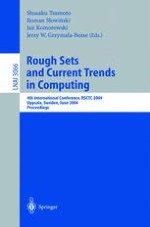2004 | OriginalPaper | Buchkapitel
Discovering Maximal Potentially Useful Association Rules Based on Probability Logic
verfasst von : Jitender Deogun, Liying Jiang, Vijay V. Raghavan
Erschienen in: Rough Sets and Current Trends in Computing
Verlag: Springer Berlin Heidelberg
Enthalten in: Professional Book Archive
Aktivieren Sie unsere intelligente Suche, um passende Fachinhalte oder Patente zu finden.
Wählen Sie Textabschnitte aus um mit Künstlicher Intelligenz passenden Patente zu finden. powered by
Markieren Sie Textabschnitte, um KI-gestützt weitere passende Inhalte zu finden. powered by
Apriori-like algorithms are widely used for mining support-based association rules. In such applications, the underlying assumption is that rules of frequent itemsets are useful or interesting to the users. However, in many applications, infrequent events may be of interest or frequency of events may have no relationship to their interestingness to the user. Apriori-like algorithms do not present efficient methods for discovering interesting infrequent itemsets. In this paper, We present a new model of Knowledge Discovery in Databases (KDD) based on probability logic and develop a new notion of Maximal Potentially Use Ful (MaxPUF) patterns, leading to a new class of association rules called maximal potentially useful (MaxPUF) association rules, which is a set of high-confidence rules that are most informational and potentially useful. MaxPUF association rules are defined independent of support constraint, and therefore are suitable for applications in which both frequent and infrequent itemsets maybe of interest. We develop an efficient algorithm to discover MaxPUF association rules. The efficiency and effectiveness of our approach is validated by experimemts based on weather data collected at the Clay Center, Nebraska, USA from 1959 to 1999.
